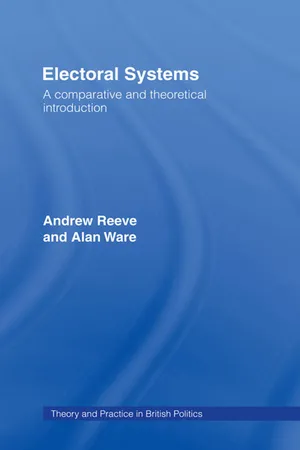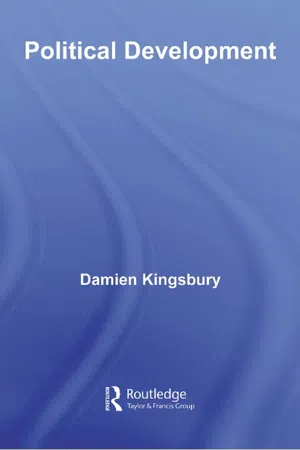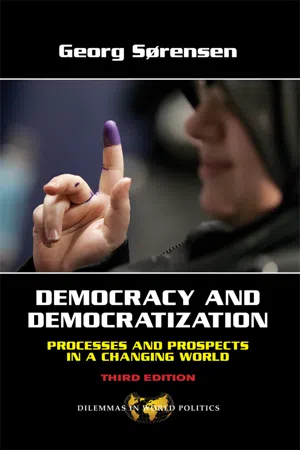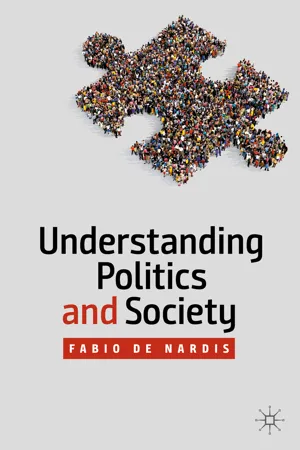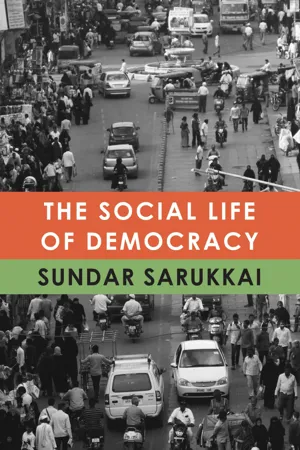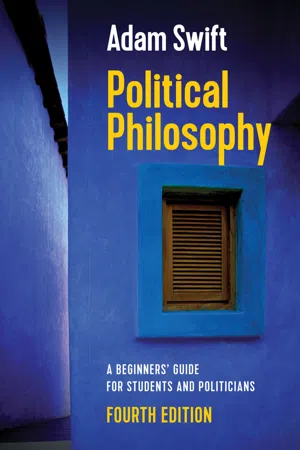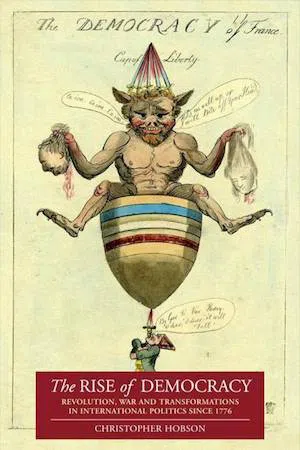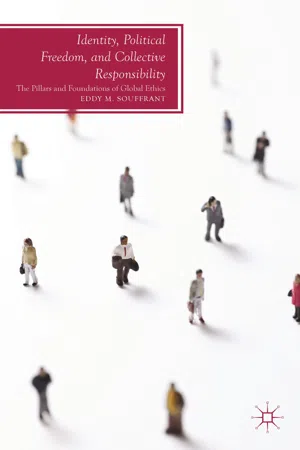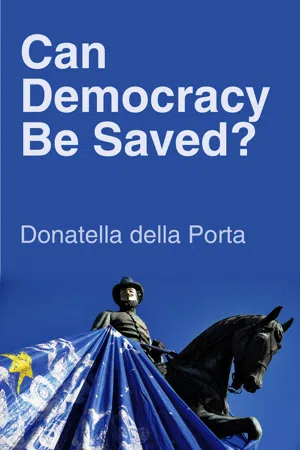Politics & International Relations
Types of Democracy
Types of democracy include direct democracy, representative democracy, and participatory democracy. In a direct democracy, citizens directly participate in decision-making. Representative democracy involves citizens electing representatives to make decisions on their behalf. Participatory democracy emphasizes active citizen involvement in the decision-making process, often through community-based initiatives and grassroots movements.
Written by Perlego with AI-assistance
Related key terms
9 Key excerpts on "Types of Democracy"
- eBook - ePub
- Andrew Reeve, Alan Ware(Authors)
- 2013(Publication Date)
- Routledge(Publisher)
Again, the British polity is claimed to be a representative system (Birch 1964: 13). Let us identify the different levels at which representativeness might be of concern under the British system. First, there is the relation between the individual voter, the constituency, and the person elected. Secondly, there is the relation between the aggregate of constituency representatives and the country (in both geographical and political terms). Thirdly, there is the relation between the representative assembly and the government. Finally, there is the relation between the government and the community as a whole. We shall want to consider each of these relations below.Obviously we must acknowledge that there are many problems associated with clarifying the meaning of democracy (for example, May 1978), and it will help to employ three distinctions in the discussion.1 First, we may distinguish between democracy conceived as a method, and democracy conceived as an ideal. Secondly, we may distinguish between direct democracy and indirect democracy. Thirdly, we may distinguish between democracy considered in relation to a single decision, and democracy considered in relation to an ongoing political process. These distinctions are interconnected, and it is useful to explore them in turn.Democracy as a method and as an ideal
Political scientists concerned to explain the operation of systems of government are inclined to adopt a 'positive' view of democracy merely as a method.2 For example, Schumpeter's definition of the democratic method was:that institutional arrangement for arriving at political decisions in which individuals acquire the power to decide by means of a competitive struggle for the people's vote. (Schumpeter 1967: 173-4)Our characterization of democracy, by contrast, acknowledged that it was one of a number of decision-making methods, but we built into our description of the method a number of normative considerations. Democracy is centred on the idea of political equality: as a method, this suggests equality in voting resources, and hence 'one person, one vote'; but as an ideal, it represents a goal which political systems approach to a greater or lesser degree. Clearly the ideal of political equality is not satisfied by the mere equality of votes, even though, when a decision is taken by voting, equal votes are a necessary condition of political equality. - eBook - ePub
- Damien Kingsbury(Author)
- 2007(Publication Date)
- Routledge(Publisher)
Lukes sees this type of analysis of power as still relying too heavily on observable conflict. Yet power may be exercised by shaping the thoughts and desires of another, to have them act in a required manner that may not be in their interests. Such “thought control” may take “mundane forms,” such as “through the control of information, through the mass media and through the processes of socialization” (1974: 24). Lukes suggests that because grievances about a power structure may not be aired or be able to be uncovered does not necessarily imply that the grievances do not exist. If a person or group does not have access to sets of ideas that inform political ideas they may still have a grievance, or continue to experience “an undirected complaint arising out of everyday experience, a vague feeling of unease or sense of deprivation” (1974: 24). Further, power may be exercised by shaping understanding in such a way as to legitimize respective roles in the existing order of things. This legitimization comes about because individuals cannot see or imagine an alternative, because it is seen as natural and unchangeable or because it is valued as “divinely ordained and beneficial.” The absence of grievance does not, therefore, necessarily equal genuine consensus, as it may reflect the deletion of the possibility of false or manipulated consensus (Lukes 1974: 24). Lukes’ definition of power, then, closely accords with the conception of “hegemony” as articulated by Gramsci. Hegemony in this sense implies the establishment and maintenance not only of political and economic control, but also agreement by a subordinate social group or class with a dominant group or class that a prevailing state of affairs is desirable (Gramsci 1971: xii–xiv). What are regarded as social and political norms, and the processes by which they are maintained, operate at both conscious and unconscious levels. Further, they are reinforced both overtly and covertly by existing power structures, which tend to primarily serve the interests of the power brokers who exercise such power structures. Some governments can therefore be seen to act primarily in their own interests, those of their close associates and of other elites. Lukes was also critical of the focus on a methodology in which power is about individuals realizing their wills (Lukes 1974: 21). He argued that the power to control the political agenda and exclude potential issues could not be adequately analyzed unless it is seen as a function of collective forces and social arrangements.Types of Democracy
As noted, the term “democracy” is has been appropriated and used in ways that have come to not just diminish but, in some contexts, have functionally eradicated its original and previously agreed meaning. Given that democracy is such a critical idea in political discussion, it appears necessary to briefly outline some of the ways in which the term has been used. There are a number of varieties of “democracy” (as well as non-democracy), which can be identified under several broad groupings, such as constitutional democracy, liberal democracy, social democracy, grass roots democracy, people’s democracy, guided democracy, and so on. There is also the question of “pre-existing democracies,” that is, polities that have participatory methods of government but which do not fall into the general category of “democracy” in the modernist and formally institutionalized sense of the term. Such polities may include smaller social groupings such as extended kinship units or tribes in which decisions are communally taken, or in which the leader or chief is directly accountable to his or her membership. - eBook - ePub
Democracy and Democratization
Processes and Prospects in a Changing World, Third Edition
- Georg Sorensen(Author)
- 2018(Publication Date)
- Routledge(Publisher)
Such dissimilarity pertains to variation in institutions and in other aspects, as well as to differences in democratic qualities. We may identify such systems as those of the United States, Botswana, Denmark, Costa Rica, Japan, and Jamaica as democracies, but the specific structures of their political systems, their political culture, and their socioeconomic environments differ substantially. One scholar has suggested making the following distinctions between various types of democratic regimes: presidential versus parliamentary; majoritarian versus representational, two-party versus multiparty, distribution of power among parties, extremist multiparty, and consociational. He defines a consociational democracy as one that has mechanisms serving to promote compromise and consensus among groups in society. 39 Such differences also indicate substantial variation in the quality of democracy in single countries, even if their ratings are similar. It is only at the level of the individual case (combined with attention to the larger international context) that we can study the interplay between formal freedoms, political processes, and the larger context of socioeconomic and other conditions that affect the quality of democracy. Moreover, if we agree with Held that democracy is made much more difficult by extreme material poverty, then it also becomes relevant to look at socioeconomic conditions as codeterminants of the quality of democracy, even if these conditions are not included in the definition of democracy as a political system. The Human Development Index compiled by the United Nations Development Program (UNDP) provides systematic, comparative information on these conditions. 40 In sum, actual democracies are dissimilar in important dimensions - eBook - ePub
- Fabio de Nardis(Author)
- 2020(Publication Date)
- Palgrave Macmillan(Publisher)
conflict and therefore direct political participation and socially shared spaces for public deliberation. With respect to the role of “interests”, the perspective varies. Where and how are they formed and how are they aggregated and organised?As della Porta points out (2013 , 9–10), in the debate on the normative theory of democracy it is possible to identify two dimensions: on the one hand, the construction of interests and identities as mechanisms external or internal to the political process; on the other hand, whether or not conflict is recognised as a fundamental dimension of the political process. Crossing the two dimensions it is possible to identify four ideal models of democracy: “liberal”, “participative”, “liberal-deliberative” and “participative-deliberative”.- “Liberal democracy” is based on the idea that identities develop outside the political process, conceived essentially in the forms of representation . It presupposes that intermediate bodies (parties) aggregate social interests external to the political system and then attempt to translate them into public policies through institutional representation. While accepting the polyarchical logic of the plurality of preferences, in the liberal logic a consensus on a series of interests compatible with the system is always expected, identifying a dysfunctional element in social and political conflict .
- “Participative democracy” represents the first theoretical challenge to liberal democracy, recognising the multiplicity of social conflicts and the need for a wide involvement of citizens in the political process beyond the casting of a vote . In any case, the participatory approach to democracy presupposes a substantial separation between social contradictions and political translation, assuming a formation of exogenous identities and interests with respect to the political process.
- “Liberal-deliberative democracy” is a variant of the classical liberal-democratic concept. Whoever looks at democracy in this perspective emphasises the endogenous dimension of identity and interest formation with respect to the democratic process
- eBook - ePub
- Sundar Sarukkai(Author)
- 2023(Publication Date)
- Seagull Books(Publisher)
When we commonly use the term ‘democracy’, we might be referring to different characteristics. One might be talking about democracy as a purely political process whereas another might be using the word to imply equality. Democracy, like all concepts, has varied meanings. It is generally the case that a concept’s meaning is given by the context in which it is used; when a group of people talk about that concept they may not mean the same thing. Even a term like ‘religion’ will have different senses when used in different contexts and by different people. For example, I might be using the word religion as something to do with a religious text, whereas the person who is responding to me might be using the same word as a set of beliefs related to faith. Another might use the word to refer to a set of practices in relation to a supernatural being called god. Thus, the conflict that we have in private and public discourse is not as much about the meanings of concepts as it is about the human tendency to use the same words with very different meanings. We often talk at cross-purposes without recognizing that we do so. Concepts such as equality, oppression, rights, democracy, justice, like almost every other concept that is part of our social life, are filled with these multiple meanings and multiple senses. So before discussing what democracy is and what it could be, one of the first things that we need to do is delineate the different meanings of this word.The most common meaning of democracy is as a political system. The commonly translated meaning of this term is ‘power of the people’, ‘rule of the people’. This idea seems simple enough: people belonging to a group should have a say in how the group should be governed and ‘ruled’, who has the power to take decisions and so on. This etymology has overly influenced the meaning of democracy and restricted it primarily to the domain of governance, power and politics. But like all influential words, this word begins to be used in other contexts and picks up different meanings. As we saw above, some of the common phrases associated with this word include the following: representative democracy, direct democracy, liberal democracy, participatory democracy, parliamentary democracy, social democracy, grassroots democracy. In our everyday talk, we often refer to undemocratic practices of institutions, schools, hospitals; children who begin to use this word do so when they are upset about being denied something and say that their parents are not being democratic. Democracy, as a general term, has a valency that allows this migration into other domains quite easily because there is something about democracy that is always more than politics.First of all, even if democracy is understood as ‘power/rule of the people’, terms such as ‘power’, ‘rule’ and ‘people’ are themselves quite ambiguous. The different meanings of democracy are put loosely under the concept of democracy because of the different meanings of these terms. In so doing, we can see why the claim that democracy is a Western notion, with its origin located among the ancient Greeks, needs to be re-examined. The first conceptual challenge lies in the idea of ‘the People’. It is not very different from the challenge of interpreting the powerful phrase ‘We, the People’, embedded in the preamble of the Indian Constitution and other democratic systems. The term ‘People’ refers to a collective. How do we define who ‘the People’ are? Are they the elite in society? Are they the ones who are ‘eligible’ to vote? Are they the educated ones? Do people of all sections, including the marginalized, women and children, have an equal belonging to this group called ‘the People’? Are ‘foreigners’ part of this group? This confusion is at the heart of many ambiguous, counter-claims about democracy and the reasons for its failure in many cases. This has been exacerbated by the repeated invocation of the popular expression that describes democracy as ‘Of the people, By the people, For the people’. This phrase appears in Abraham Lincoln’s Gettysburg Address and it is instructive to see the line in which it is used: ‘... that these dead shall not have died in vain—that this nation, under god, shall have a new birth of freedom and that government of the people, by the people, for the people shall not perish from the earth’.7 - eBook - ePub
Political Philosophy
A Beginners' Guide for Students and Politicians
- Adam Swift(Author)
- 2019(Publication Date)
- Polity(Publisher)
Here we are talking about the difference between correctness and legitimacy. And one important thing that philosophers try to offer is a correct theory of legitimacy. What is it that makes democratic decisions indeed legitimate? What kinds of responsiveness to the popular will are in fact necessary or sufficient for a law to be justified? These are unavoidably philosophical questions. The legitimacy of a decision can indeed be independent of its rightness – but there can still be a right answer about what makes a decision legitimate. And, of course, one can perfectly well have views about what makes a decision legitimate and about what would be the right decision for a political community to take on any particular issue. Most of us have both of these. So philosophers, and everybody else, can quite coherently argue and vote for a particular outcome as the right answer while also insisting that only some ways of making such decisions are legitimate – and insisting that decisions made that way remain legitimate even if they are incorrect. The core issue in democratic theory is why it is valuable that people, or ‘the people’, should be involved in making the rules to which they are subject.Degrees of democracy
As a way in, let’s think about the various ways in which the democraticness of a political system is a matter of degree. It’s tempting to think that either a state is democratic or it isn’t. In fact, however, exploring the different ways in which decisions, or states, might be less or more democratic helpfully forces us to get clear on what we mean when we talk about democracy in the first place. One lesson that some learn from the exercise is that, even though democracy is indubitably a good thing, they do not want too much of it.Here, then, are four dimensions along which it seems that societies, or political systems, or the decisions produced by those systems, can be considered less or more ‘democratic’.1 Directness or indirectness of the decision
Decision-making is directly democratic when the people as a whole vote directly on the issues under consideration. It is indirectly democratic when they vote for representatives who make the decisions on their behalf. The US and the UK operate systems of representative democracy. Occasionally the UK holds a referendum on a particular issue, where the matter is felt to be sufficiently important or controversial to require a direct mandate from the people as a whole for the decision to be legitimate. Decisions made by referendum, where the people’s will is expressed directly, are in an obvious sense more ‘democratic’ than those made by representatives. That is not, of course, to say that they are better in any way. They may not be better decisions. Referenda may not even be a better way of making decisions. But they are a more democratic way. - eBook - ePub
- Christopher Hobson(Author)
- 2015(Publication Date)
- Edinburgh University Press(Publisher)
This study is thus engaging in a form of constitutive analysis: examining the question of how democracy’s meaning and value have been constructed over time in international politics and in so doing, ‘tracing the processes of how it mattered ’ (Price and Reus-Smit 1998: 276, 282; original emphasis). The book charts how this occurred, with one eye towards the past, and the other towards the future. It is a story that begins in the second half of the eighteenth century in the United States, the subject of the next chapter. Notes 1 The literature on this topic is already enormous and continues to expand (if not go round in circles). R. J. Rummel has compiled a comprehensive bibliography of work on democratic peace theory, available at https://www.hawaii.edu/powerkills/BIBLIO.HTML (up until 2000) and http://www.hawaii.edu/powerkills/DP.BIBLIO.2009.HTML (2000–9) (both accessed 16 February 2015). 2 In operationalising democracy, scholars largely rely on the Polity and Freedom House data sets, while the Correlates of War project (CoW) is the primary source for determining war and peace in the international system. A comprehensive list of different regime type data sets is provided by Paul Hensel at http://www.paulhensel.org/datapol.html (accessed 16 February 2015). For the CoW project, see http://www.correlatesofwar.org (accessed 16 February 2015). 3 Representative is the definition provided by Russett: ‘For modern states, democracy (or polyarchy, following Dahl 1971) is usually identified with a voting franchise for a substantial fraction of citizens, a government brought to power in contested elections, and an executive either popularly elected or responsible to an elected legislature, often also with requirements for civil liberties such as free speech’ (Russett 1993: 14). 4 According to Google Scholar, Barkawi and Laffey’s 1999 article has been cited 147 times as at 14 January 2015 - eBook - ePub
Identity, Political Freedom, and Collective Responsibility
The Pillars and Foundations of Global Ethics
- E. Souffrant(Author)
- 2013(Publication Date)
- Palgrave Macmillan(Publisher)
S peaking in any intelligible way of globalization is to presume the plausibility or the actual existence of an orderly or patterned global environment. My working hypothesis has been that democracy is in its base sense the interaction of equally valued members of a group aiming to arrive at an agreed-on institution of governance. The current mood in the contemporary world is to realize a version of national democracy, in effect globalizing a sense of democracy. The argument, then, is to suggest that the prospective increase in the adoption of democracy as a mode of internal or national governance would engender a global environment where democracy would reign as the predominant, if not the only, type of governance. This future would constitute one sense of global democracy. Some have thus become advocates of the prevalence of this interpretation of a global democracy. I contend, however, that the three general categories proposed to understand the operative contemporary senses of global democracy have one basic idea. They hold that global democracy would be a representative concept fit for the contemporary environment. All three, however, fall short of the foundational tenets of democracy expressed earlier.In the first two interpretations of global democracy, Soyinka’s appeal to the international community against his country of birth, Nigeria, and the perceived factual trend toward local democracy making democracy an ideal of governance globally, there is neither a substantive nor a procedural claim to an overriding self-governing structure. In Soyinka’s view, democracy is an uncontested good, while the second interpretation relies on the speculation that there is a global trend toward national democracy. The translation from national to global democracy is not a given. All appeals to a democratic global environment stem from an unsettled and unsettling global environment. Global democracy is an attempt to articulate a program of political accountability from (a) an informal global setting of diverse constituents and (b) the determination that specific groups or nation-states value the exercise of a version of governance. The third suggestion of global democracy seeks to determine whether the informal atmosphere in the global environment can accommodate the establishment of a feasible or prescriptive, and therefore formal, democratic global institution. - eBook - ePub
Can Democracy Be Saved?
Participation, Deliberation and Social Movements
- Donatella della Porta(Author)
- 2013(Publication Date)
- Polity(Publisher)
Deliberative forms of democracy have also been advocated as a way to channel the support of critical citizens into democratic institutions by building upon the assumption that contemporary democracies (at the local, national and supranational levels) need to combine representative institutions with other arenas. As Dryzek (2010, 40) noted, ‘Democracy does not have to be a matter of counting heads – even deliberative heads. Nor does it have to be confined to the formal institutions of the state or the constitutional surface of the political life. Accepting such confinement means accepting a needlessly thin conception of democracy.’ In the past, participation developed especially within political parties, where the reference to common values permitted the formation of collective identities. As mentioned earlier (see chapter 2), the very processes of economic globalization and political transnationalization challenge representative forms of democracy as they have developed within the nation state.Recently developed partial solutions to the weaknesses of representative democracy appear far from satisfactory. Technocratic models of democracy, based on the assumption of consensual goals (such as economic development) to be reached with the input of experts or public bureaucrats, are accused of disempowering (and alienating) citizens (Sanderson 1999). Media democracy, with legitimation mediated by mass media, has facilitated populist appeals – as commercialization and centralization in the media system have encouraged the trend away from information and critical debate. In this context, interest has risen, among scholars as well as practitioners, in forms of democracy variously defined as deliberative.Faced with these perceived challenges to representative democracy, the virtues of deliberative democracy are said to include legitimation on the input side and efficacy on the output side: ‘Beyond its essential contribution to democracy per se, citizen participation in the policy process can contribute to the legitimization of policy development and implementation’ (Fischer 2003, 205). For Bernard Manin, the legitimacy of the decision is the outstanding product of the deliberative theory of democracy: ‘A legitimate decision is one that results from the deliberation of all. It is the process by which everyone’s will is formed that confers its legitimacy on the outcome’ (1987, 351–2). Also for Seyla Benhabib (1996, 69), deliberation ‘is a necessary condition for attaining legitimacy … with regard to collective decision-making processes in a polity … what is considered in the common interest of all results from processes of collective deliberation’. And for Amy Gutmann (1996, 344), ‘the legitimate exercise of political authority requires … decision-making by deliberation among free and equal citizens’. In this sense, deliberative democracy is ‘a normative account of the bases of democratic legitimacy’ (Young 2003, 103). Deliberation, as a ‘dispassionate, reasoned, logical’ type of communication, promises to increase citizens’ trust in political institutions (Dryzek 2000b, 64). Indeed, scholars highlighted a ‘moralising effect of the public discussion’ (Miller 1993, 83) that ‘encourages people not to merely express political opinions (through surveys or referendum) but to form those opinions through a public debate’ (1983, 89).
Index pages curate the most relevant extracts from our library of academic textbooks. They’ve been created using an in-house natural language model (NLM), each adding context and meaning to key research topics.
